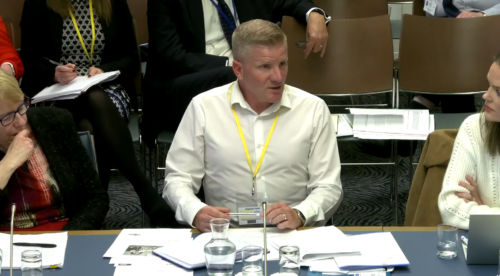
Northern Ireland, Scotland and Wales Children’s Commissioners react to UNICEF report on poverty
“The findings of UNICEF’s report ‘Child poverty in the midst of wealth’ are deeply concerning.
NewsThe stark reality of poverty in Northern Ireland is “children can’t wait any longer,” the Children’s Commissioner has told the Inquiry into Child Poverty in Northern Ireland at the Public Accounts Committee.
Chris Quinn told MLAs at the committee on Thursday (June 20) that no child should have to worry about where their parents are finding the money to pay for their next meal.
The Commissioner sat alongside Trása Canavan, Chair of the Anti Poverty Co-Design, and Goretti Horgan, Member of the Anti Poverty Expert Panel, to give evidence to the inquiry.

The Commissioner said: “Poverty is one of the main priorities for NICCY, and my team and I had identified that before coming into post.
“The effect of poverty is devastating. I have visited many communities, and it is a disgrace that in times of crisis, children’s rights suffer disproportionately.
“It is deeply concerning the delay on implementing an anti-poverty strategy and the impact it is having. There have been very little sustained improvements from 2016 regarding poverty, and that is terribly worrying.”
The Commissioner also told the inquiry that the current models of strategy development, delivery and reporting are not fit for purpose in terms of delivering real outcomes on the ground.
He added that the Government needs to listen to children and young people as well as organisations who work closely with children and families who experience poverty.
Five considerations were put to the inquiry from the Commissioner.
The first was poverty is a blight on children’s lives and a breach of children’s rights.
Chris said: “According to recent figures from the Department for Communities (DfC), one in four children are living in poverty and that is not an accident – it is a political choice. The resources are not being directed to children and, with early intervention and better investment of public resources, we can lift children out of poverty.”
The second area of consideration put to the inquiry by the Commissioner was highlighting that the Child Poverty Strategy was a legislative requirement, and yet deadlines were breached – and this is not unusual.
Chris queried: “Why is this not a priority for the Executive – there is no reason for it to be delayed. When requirements to develop and implement strategies are set in legislation, this reflects an absolute commitment to their delivery.
“However, in practice when there is inaction or delay in response to statutory requirements, there appear to be few repercussions.”
The Commissioner said the third area has been the lack of sufficient focus in involving experts by experience, and the intended beneficiaries in developing high-level strategies.
“Children and young people have a right to have a say on issues that effect their lives.
“The reasons given for them not being involved was due to resources and pressure to do so in a very short time frame. Those reasons are not good enough when so many children are living in poverty. This is not acceptable.”
The fourth area for consideration was the anti-poverty strategy requiring a ring-fenced budget.
Chris added: “I fully understand we are currently in a very difficult financial situation, but the Children’s Services Co-Operation Act (CSCA) provides an enabling power for statutory bodies and agencies to pull resources and facilitate collaborative working, but this continues to appear to be problematic. I believe it is feasible to allocate funding to an anti-poverty strategy.”
The fifth area, the Commissioner said, was leadership at the highest level is required to drive delivery of strategies.
“We require close collaboration; however, it seems to be proving difficult to even get these issues on to agendas. Good intentions do not change the number of children in poverty, so an important part of this committee is how public money is being spent.
“Cross-Executive strategies are recognised as being some of the most important strategies, requiring close collaboration between departments and agencies to develop and deliver.
“Arguably, moving responsibility for both poverty strategies and children and young people’s strategies from OFMDFM to other departments has not proved effective, and returning responsibility to TEO should be considered.”
The Commissioner concluded: “This is about children and families, it’s their lives that we want to make a difference to.
“When I am speaking with children, they are worrying about the cost of food and where their mummy and daddy will get the money from to buy food and pay bills. This should never be the case.
“Poverty is a solvable problem, and children don’t have time to wait any longer for action to be taken.”

“The findings of UNICEF’s report ‘Child poverty in the midst of wealth’ are deeply concerning.
News
Poverty Persists and Children will Bear the Burden - Children's Commissioners
News
As Children’s Commissioners for Wales, Scotland, and Northern Ireland, it is our job to promote…
News